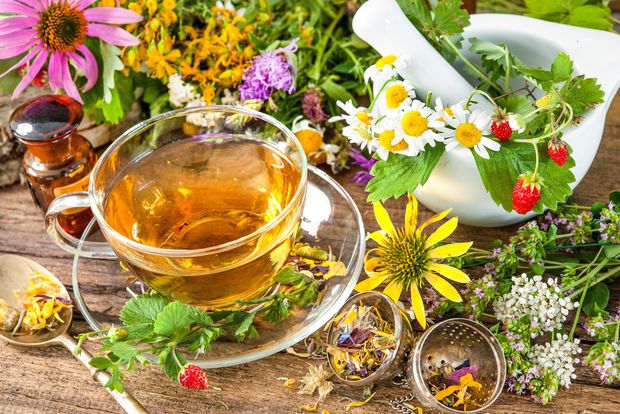
Herbal therapy is an age-old, non-invasive practice that is rapidly increasing in popularity. Though offered in a few traditional medical settings, herbal therapy is mainly used as an alternative to conventional medical treatment. Herbal therapy treatments may involve the use of herbal infusions, extracts, and dietary advice aimed at managing short-term and chronic health conditions, such as knee pain. Though herbalism is not as heavily researched as pharmacological treatments, there are many reported benefits and few known risks associated with this holistic practice. Therefore, herbal therapy is a valid option for people looking to manage knee pain with natural remedies.
This article will provide an overview of herbal therapy and explore the potential of herbs to help manage knee pain. Furthermore, it will discuss some of the most common herbs used to treat knee pain, including their properties, dosage instructions, and potential side effects. The goal is to provide readers with detailed information on herbal therapy and the use of herbs to alleviate knee pain.
An Overview of Herbal Therapy
Herbal therapy has been practiced for centuries and is believed to offer a range of health benefits. In general, herbal therapy treatments are aimed at providing general support and relief for a variety of symptoms. Herbalists use an array of herbs and herbal combinations to maximize therapeutic effects and support the body’s overall health. When used correctly, herbs can be quite effective in providing relief for a number of ailments, including knee pain.
Herbal therapy is a holistic practice that considers the mind, body, and spirit. During a treatment, a qualified herbalist will interview the patient to learn more about their medical history and lifestyle choices that can contribute to their knee pain. The herbalist will then design a personalized program for the patient, providing a combination of herbal extracts, dietary advice, and lifestyle modifications. Furthermore, treatment may include massage, acupressure, and aromatherapy—all of which are known to provide additional pain relief.
Common Herbs Used to Treat Knee Pain
Though there is no single herb that can provide complete relief from knee pain, there are several that can help to lessen the intensity of the discomfort. Below are some of the most common herbs used to treat knee pain and their associated properties and effects.
Ginger: Ginger is a pungent herb that is widely used for its anti-inflammatory effects. Studies have shown that the active compound in ginger, gingerol, has been shown to reduce pain and swelling in arthritic joints. For knee pain, ginger is usually added to foods or taken in capsule form.
Curcumin: Curcumin is a potent anti-inflammatory compound derived from the spice turmeric. Curcumin has been found to reduce swelling and inflammation, providing much-needed relief from knee pain. Traditionally, it is taken in capsule form, but it can also be added to food.
Turmeric: Turmeric contains a powerful compound known as curcumin which is known for its anti-inflammatory properties. Studies have shown that curcumin can reduce knee pain from osteoarthritis, making it a popular treatment option for the condition. It is recommended that adults take 1.5 to 3 grams of turmeric per day to reduce knee pain and inflammation.
Willow Bark: Willow bark contains salicin, an active compound related to aspirin that is known to reduce swelling and inflammation. To treat knee pain, the bark is often taken in capsule form or infused in a tea.
Arnica: Arnica has been used for centuries to reduce inflammation and provide relief from pain. Several studies have shown that topical application of arnica gel can help reduce symptoms related to knee pain caused by osteoarthritis. It can also be taken internally, although it is not recommended for those with kidney problems.
Boswellia: Boswellia, or frankincense, is an herb used in Ayurvedic and traditional Chinese medicine for its anti-inflammatory and pain-relieving effects. It has been found to be particularly effective in reducing the discomfort associated with knee pain. The herb is typically taken in capsule form.
Feverfew: Feverfew is an herb traditionally used to reduce inflammation and the frequency of headaches. Recent studies have shown that the herb may also be beneficial in relieving knee pain. It is most commonly taken in capsule form or brewed into tea.
Kelp: Kelp is a source of natural glucosamine, a compound known to reduce inflammation and support joint health. Taking a daily kelp supplement is a popular natural remedy for knee pain.
Devil’s claw: Devil’s claw is an herb native to Southern Africa and has been used for centuries to reduce pain and inflammation. Scientific studies have shown that taking 500 to 1000 milligrams of devil’s claw extract per day can reduce pain, stiffness, and swelling associated with knee pain.
Dosage and Safety
Herbal therapy treatments are designed to be taken safely and with minimal side effects, though there are still certain risks associated with mistakenly taking too much of a herb or supplement. For your safety, it is best to consult a qualified herbalist prior to using any herb or supplement to treat knee pain. The herbalist will provide a personalized dosage regimen that is tailored to your unique needs.
In general, powdered herbs and herbal teas are dosed according to the manufacturer’s instructions. For capsules and tinctures, most adults should take between one and three capsules per day depending on the strength of the supplement. Again, it is essential to consult with a qualified herbalist before starting any kind of herbal therapy program.
Final Thoughts
Herbal therapy is a holistic practice that is popular for its ability to treat a variety of health conditions, including knee pain. Different herbs and herbal combinations offer varying levels of pain relief and anti-inflammatory effects, and when taken correctly can provide much-needed comfort for those suffering from knee pain. Before beginning any type of herbal therapy program, it is important to consult with a qualified herbalist who can provide personalized advice and dosage instructions.
FAQs
1. What is Herbal Therapy for Knee Pain?
Herbal therapy for knee pain is a holistic approach to dealing with the pain and inflammation associated with the condition. It involves using plants and herbs that have anti-inflammatory and analgesic effects to reduce discomfort and inflammation. Herbal remedies can be taken orally, applied topically, or given in a tincture or capsule form. Herbal therapy is a natural, safe, and effective way to address the discomfort and pain of a knee condition.
2. What are the Different Herbal Remedies for Knee Pain?
There are many different types of herbs that can be used for the treatment of knee pain. Some of the more popular herbs include turmeric for its anti-inflammatory effects, ginger for reducing joint inflammation, bromelain for aiding tissue repair and joint stiffness, cayenne for reducing pain and inflammation, willow bark as an analgesic, and comfrey for its healing effects. Other herbs like devil’s claw, St. John’s wort, and boswellia can also provide relief.
3. How Should I Take Herbal Remedies for Knee Pain?
Herbal remedies can be taken orally, applied topically, or given in a tincture or capsule form. Topical creams and ointments can be used to reduce inflammation and provide a numbing effect for pain. Tinctures or capsules are taken orally and are a convenient way to get the natural compounds into the bloodstream. Before adding any herbal product to your regular regimen, it’s important to discuss it with your healthcare provider to rule out any potential drug interactions or allergies.
4. Are There Any Side Effects to Herbal Therapies for Knee Pain?
The side effects associated with herbal therapies are generally mild and vary from person to person. As with any supplement or medication, it is important to discuss any possible side effects with your healthcare provider before starting a new regimen. Popular herbs for treating knee pain such as turmeric and ginger have few known side effects, but it’s always important to check with your provider before adding them to your diet.
5. How Long Will It Take for Herbal Treatment to Work?
The amount of time it takes for herbal treatments to work depends on the severity of the knee pain, the type of herbal remedy used, and the individual’s body. Generally, pain relief should be seen somewhere between 1-3 weeks. However, some people may experience relief earlier or later. It is important to be patient and consistent with the treatment• and to discuss any concerns with your healthcare provider.






